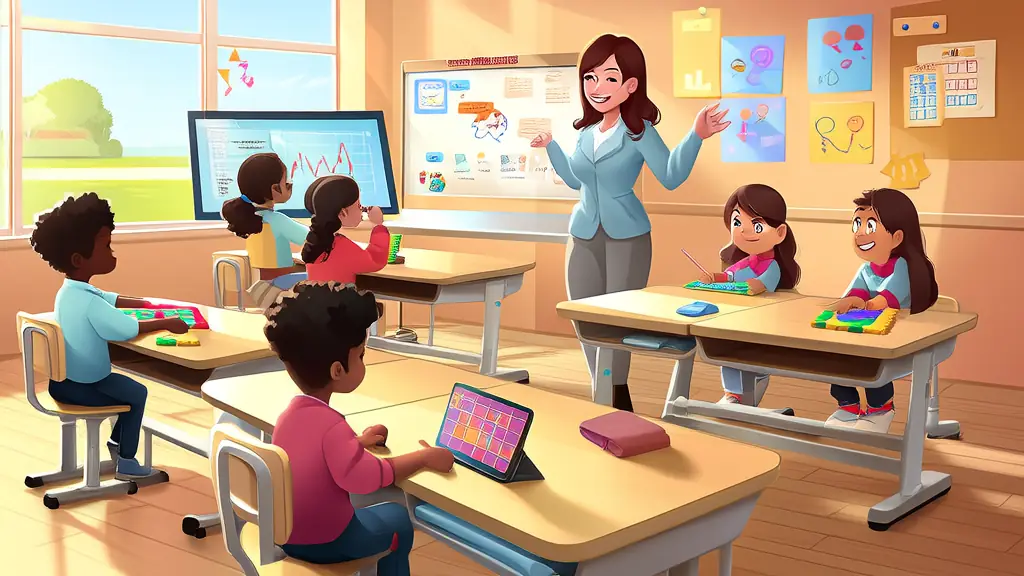
www.uitgedu.com | 自然英语拼读 | KET | PET | 英语点读学习资料
Empowering the Future: Navigating K12 Education in 2025
In a world that is constantly evolving, so too must our approach to education. As we stand in August 2025, it's clear that the landscape of K12 education has undergone significant transformations, driven by advances in technology, new research on child development, and innovative teaching methodologies. This blog post aims to provide parents and educators with valuable insights into these changes, along with practical tips and inspiring success stories that can help shape the educational journey of our children.
Latest Teaching Methodologies and Their Effectiveness
One of the most exciting shifts in K12 education is the move towards more student-centered learning approaches. Project-Based Learning (PBL) and Flipped Classrooms are two such methodologies gaining traction for their ability to engage students more deeply with the material and foster critical thinking skills.
Example: A high school in California adopted PBL across its science curriculum, resulting in a 25% increase in student engagement and a 30% improvement in test scores over three years. Students worked on real-world problems, such as designing sustainable urban planning models, which not only enhanced their academic performance but also prepared them for future challenges.
Actionable Advice: Teachers can start small by integrating one project per semester and gradually expand as they become more comfortable. Parents can support this at home by encouraging their children to apply what they learn in class to everyday situations, fostering a connection between school and real life.
Child Development Insights and Research
Recent research in neuroscience and psychology has provided deeper insights into how children learn best. For instance, studies have shown that emotional well-being plays a crucial role in cognitive development. Schools that prioritize social-emotional learning (SEL) programs see improved academic outcomes and better mental health among students.
Example: An elementary school in New York implemented a comprehensive SEL program that included mindfulness practices, emotional regulation techniques, and conflict resolution workshops. Over two years, the school reported a 40% decrease in disciplinary incidents and a 20% increase in overall student satisfaction.
Actionable Advice: Educators can incorporate short, daily mindfulness exercises into their routines. Parents can create a supportive home environment by practicing active listening and validating their children's emotions, helping them develop resilience and empathy.
Educational Technology Trends
The integration of technology in K12 education has been a game-changer. Tools like artificial intelligence (AI), virtual reality (VR), and adaptive learning platforms are making learning more personalized and accessible. AI-driven tutoring systems, for example, can provide instant feedback and adjust the difficulty level based on a student's progress.
Example: A middle school in Texas used an AI-powered math platform that adapted to each student's learning pace. The result was a 35% improvement in math proficiency scores within one year. Students who previously struggled with traditional methods found the interactive and adaptive nature of the platform more engaging.
Actionable Advice: Teachers can explore and integrate these technologies into their lesson plans, ensuring they complement rather than replace human interaction. Parents can stay informed about the tech tools their children use and actively participate in discussions about digital literacy and safety.
Practical Tips for Parents and Teachers
Both parents and teachers play a vital role in the educational journey of a child. Here are some practical tips to enhance the learning experience:
- Stay Informed: Keep up-to-date with the latest educational trends and research. Attend webinars, read educational blogs, and join professional networks.
- Communicate Regularly: Maintain open lines of communication between home and school. Regular check-ins can help address any issues early and ensure that both parties are aligned in supporting the child.
- Encourage Curiosity: Foster a love for learning by encouraging questions and exploration. Provide opportunities for hands-on experiences and creative projects.
- Set Realistic Goals: Work together to set achievable goals for the child. Celebrate small victories and provide constructive feedback to help them grow.
Conclusion
The future of K12 education is bright, thanks to the continuous evolution of teaching methodologies, a deeper understanding of child development, and the integration of cutting-edge technology. By staying informed, communicating effectively, and fostering a supportive and engaging learning environment, parents and educators can empower the next generation to reach their full potential.
Let’s continue to work together to make education a transformative and enriching experience for all our children. Together, we can build a brighter future, one lesson at a time.